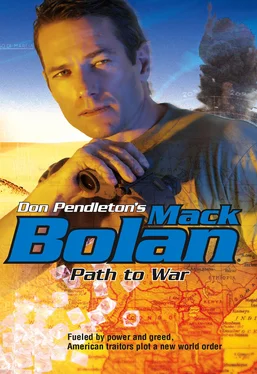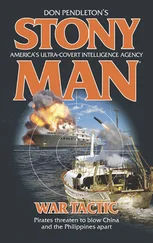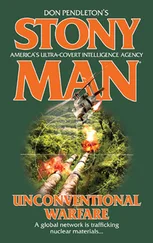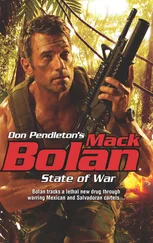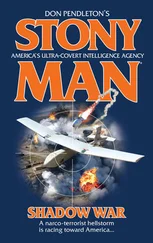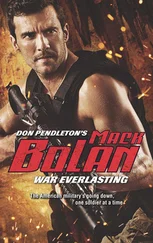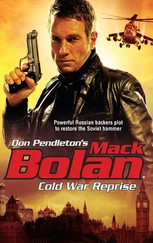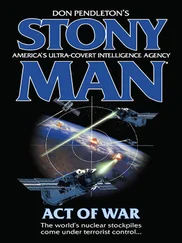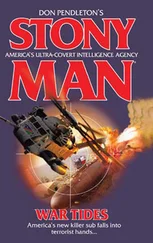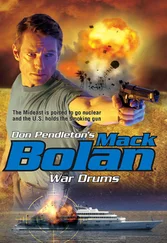Bolan fired two rounds toward the terrorist’s head
“You’re insane!” Kairoush shouted.
“I’ve never been more stone-cold. The next ones are for real,” the Executioner vowed. “I want to know about the North Koreans. I want to know where the backpack nuke is, or how I can get to it. Or I shoot to kill.”
“I will talk!”
And he did, spinning a tale so sordid its magnitude was difficult to absorb. Bolan was turning toward Dawkins when autofire rang out, the soldier flinching as he glimpsed a ragged line of holes dancing across the terrorist’s chest.
Black-clad, armored storm troops surged into the warehouse.
“Freeze! Lose the guns!”
Bolan found himself staring at Commander Tachjine, the muzzle of the Moroccan’s machine gun pointed at his chest.
Other titles available in this series:
Inferno
Ambush
Blood Strike
Killpoint
Vendetta
Stalk Line
Omega Game
Shock Tactic
Showdown
Precision Kill
Jungle Law
Dead Center
Tooth and Claw
Thermal Strike
Day of the Vulture
Flames of Wrath
High Aggression
Code of Bushido
Terror Spin
Judgment in Stone
Rage for Justice
Rebels and Hostiles
Ultimate Game
Blood Feud
Renegade Force
Retribution
Initiation
Cloud of Death
Termination Point
Hellfire Strike
Code of Conflict
Vengeance
Executive Action
Killsport
Conflagration
Storm Front
War Season
Evil Alliance
Scorched Earth
Deception
Destiny’s Hour
Power of the Lance
A Dying Evil
Deep Treachery
War Load
Sworn Enemies
Dark Truth
Breakaway
Blood and Sand
Caged
Sleepers
Strike and Retrieve
Age of War
Line of Control
Breached
Retaliation
Pressure Point
Silent Running
Stolen Arrows
Zero Option
Predator Paradise
Circle of Deception
Devil’s Bargain
False Front
Lethal Tribute
Season of Slaughter
Point of Betrayal
Ballistic Force
Renegade
Survival Reflex
Path to War
Don Pendleton

Do not seek evil gains; evil gains are the equivalent of disaster.
—Hesiod
c.700 B.C.
Man makes his own choices. He chooses to either travel the righteous path, or to go the way of Animal Man. Without punishment for conscious and willful evil acts, Animal Man wins. My job is to level the playing field.
—Mack Bolan
To the unswerving dedication of the men and women of the Department of Justice
CHAPTER ONE
CHAPTER TWO
CHAPTER THREE
CHAPTER FOUR
CHAPTER FIVE
CHAPTER SIX
CHAPTER SEVEN
CHAPTER EIGHT
CHAPTER NINE
CHAPTER TEN
CHAPTER ELEVEN
CHAPTER TWELVE
CHAPTER THIRTEEN
CHAPTER FOURTEEN
CHAPTER FIFTEEN
CHAPTER SIXTEEN
EPILOGUE
Kinbuvu Gaungalat considered the monster holed up in the apartment, and images of predators on the high savage end of the food chain leaped to mind. The former UNITA colonel may have staked his surveillance point from the dark end of an alley in Old Madrid, somewhere deep in the maze of cobbled streets choked with adobe apartment buildings, plazas, restaurants, bars, monasteries and convents, but numerous visions of feeding frenzies seemed to burn, alive and thrashing, the longer he stared at the wrought-iron balcony, nursing hatred, craving revenge.
And there it came, in living color, it seemed, as he felt the fire searing out from the core of his soul.
He envisioned the lioness on the savanna, her jaws clamped on the throat of a zebra as she took it down in a blast of dust and spewing blood. Then he pictured the crocodile, erupting out of brown waters in a great spume as its razor-sharp teeth clamped the neck of a gazelle that had fallen behind the pack in the river crossing, dragging it beneath the surface, drowning it in a death roll, the beast’s throat filling with the blood of its victim before the real devouring began. He imagined next the white shark, its massive dark shape boiling, a torpedo with teeth the size of celery stalks, as it surged up from the depths of the waters around South Africa’s Seal Island, a crimson cloud spraying the air before the creature splashed down to consume its meal in a frothy scarlet maelstrom.
Ultimate predators, driven by primal instinct to consume flesh to survive.
All of which, he decided, was simply the beautiful brutality of nature sorting out the food chain, the larger, more aggressive and dangerous animals ruling supreme, deciding, for the most part, what would live, what would fall prey to fill its belly. Something always, it seemed to him, had to die so something could live. And that held especially true, he concluded, in the world from where he came.
Only the predator he wished to kill had never displayed even a scintilla of such courage, much less any skill in those death hunts of wild animals. No, the monster in hiding was a mass murder, he knew, a coward who wallowed in the lap of obscene luxury while others risked their lives to carry out his homicidal dictates, swell his coffers with money earned on the blood of those he oppressed.
That in mind, Gaungalat reached into the dark vault of the gruesome past. For a moment he felt a stab of pain and bitter remorse as he weighed the awful truth about the living hell that was Angola. Like many of his countrymen he was Christian, a Roman Catholic, in fact, his ancestors converted by European missionaries who had passed on the teachings of their faith and their Bible down through the generations. Thus, recalling the Book of Revelation, he couldn’t help but picture the former Portuguese colony as a vast and eternal plague of death, war, starvation and pestilence, delivered unto all—in spirit, if nothing else, as far as he was concerned—a terrifying preview of the Four Horsemen of the Apocalypse. But had he not played a small part in the madness of genocide, razing villages where rival MPLA rebels were suspected of hiding large weapons caches, only to slaughter their women and children? he wondered. Had he not turned a blind eye when his soldiers vented anger and hatred through orgies of rape, torture and mutilation on helpless victims? Had he not, as overlord of the diamond mines of Cuango, personally flayed with bullwhip the impoverished miners and near to death?
He had, in time, aborted the course of the Four Horsemen, at least in his private corner of command and control, but not before dipping his hands into figurative rivers of the blood of the innocent.
So, then, was he any better than the monster he had come here to slay?
Oh, but he was, he told himself as he grasped the mini-Uzi hung in webbed nylon rigging beneath his long coat. Had he not turned his back on his old ways, rebelled against the monster, and nearly at the cost of his own life? Was he not sickened for years after by the mere thought of how he could have done what he did for so long to so many? Was it not all he could have done, in feverish dark nights of the soul, weeping alone, begging the God of his understanding for mercy and forgiveness, to have not taken his own life?
He fingered the compact subgun with his left hand, then shucked the other side of his coat higher up, feeling the empty space where his right arm should have been, grinding his teeth at the memory of the amputation, delivered to him for dereliction of duty, or so according to the monster. In his own war-torn nation he knew he wouldn’t present himself such an aberration, where, he heard, it was estimated by the Red Cross and World Health Organization that almost forty percent of eleven million Angolans were missing a limb—or limbs—either blown off in a land estimated to be planted with twenty-five million mines and other boobytraps, or hacked off.
Читать дальше
